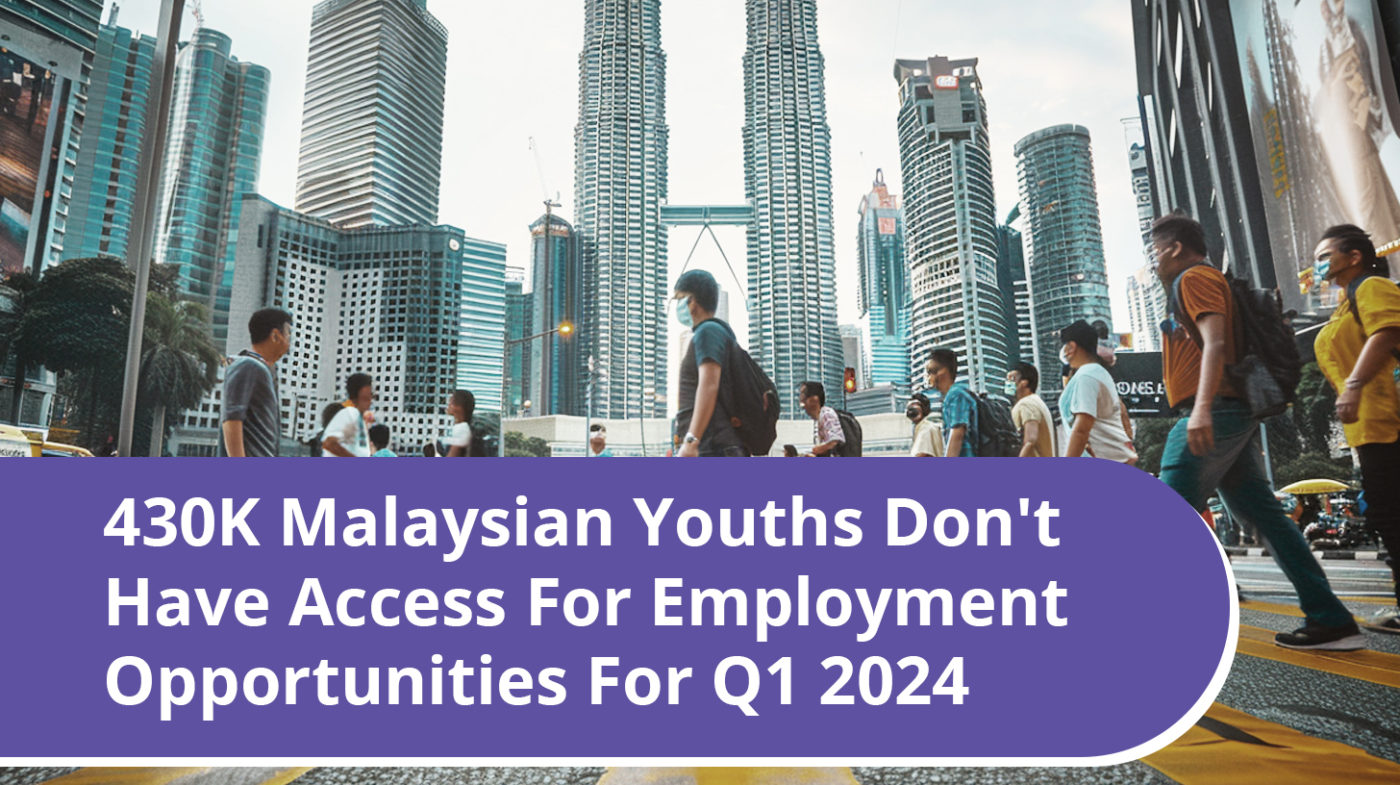In recent times, the Malaysian job market has been grappling with significant challenges, particularly affecting the nation’s youth population. A staggering 430,000 Malaysian youths, aged between 15 and 30, currently find themselves unemployed, signaling a pressing issue within the country’s employment landscape. Compounding this concern is the anticipation of a substantial influx of graduates into the job market, with an estimated 5 to 6 million youths expected to graduate in 2024 alone. This surge in graduates, however, contrasts sharply with the sluggish pace of job creation experienced in 2023, exacerbating the already formidable obstacles faced by young job seekers striving to secure employment opportunities.
The Impact On Malaysia’s Future
Youth unemployment poses multifaceted challenges to any nation, transcending mere economic ramifications to deeply impact societal well-being and future prospects. In Malaysia, where 430,000 youths between the ages of 15 and 30 are currently unemployed, the consequences are particularly profound. Beyond the individual hardships endured by young job seekers, the broader socio-economic fabric of the nation is strained. High rates of youth unemployment contribute to increased poverty levels, stunted economic growth, and heightened social unrest, as disillusioned youths grapple with limited opportunities for self-sustainability and advancement.
Compounding this issue is the concerning statistic that half of Malaysian youths have less than RM10,000 in savings within their Employees Provident Fund (EPF) accounts. This financial vulnerability not only underscores the precariousness of youth employment but also magnifies the potential long-term repercussions. Insufficient savings impede youths’ ability to invest in education, housing, and entrepreneurship, perpetuating a cycle of financial instability that reverberates throughout the economy.

Brain Drain Effect
Moreover, Malaysia faces the persistent challenge of brain drain, wherein its brightest talents seek opportunities abroad due to limited prospects domestically. This phenomenon exacerbates the effects of youth unemployment, as skilled individuals opt to leave the country in pursuit of better career prospects and higher standards of living elsewhere. As a result, Malaysia not only loses valuable human capital but also struggles to retain the intellectual resources necessary for innovation and sustainable development.
A study conducted in February 2024 further illuminates the gravity of the situation, revealing that three-quarters of Malaysian youths employed in Singapore are either highly skilled or semi-skilled, earning substantially higher incomes than their counterparts at home. This exodus of talent exacerbates Malaysia’s brain drain conundrum while underscoring the urgent need for comprehensive strategies to address youth unemployment and retain skilled professionals within the country’s borders.
Economic
Youth unemployment casts a significant shadow over Malaysia’s economic landscape, impeding its growth trajectory and exacerbating existing disparities. Economically, the underutilization of youthful talent represents a substantial loss in productivity and innovation potential. With a large segment of the population unable to secure gainful employment, consumer spending dwindles, dampening demand for goods and services and hindering overall economic expansion. Furthermore, the burden of supporting unemployed youths falls heavily on government resources, diverting funds that could otherwise be allocated to critical infrastructure projects or social welfare initiatives aimed at fostering inclusive growth.
Politic Stability
Beyond its economic ramifications, youth unemployment also poses a potent threat to Malaysia’s political stability. Frustration and disillusionment among unemployed youths can foment social unrest, fueling dissatisfaction with governmental policies and exacerbating tensions within society. This discontent may manifest in various forms, including protests, civil disobedience, or even radicalization, as disenfranchised youths seek avenues for expressing their grievances and effecting change. In the long term, such instability undermines investor confidence, deters foreign investment, and compromises Malaysia’s standing on the global stage, further exacerbating the economic challenges wrought by youth unemployment.

What We Can Do To Overcome?
To overcome the challenges of youth unemployment in Malaysia, proactive measures must be taken, including early involvement of industry knowledge for students. By integrating industry insights into educational curricula from an early stage, students can gain practical skills and relevant knowledge that align with the demands of the job market. This can be achieved through partnerships between educational institutions and industries, facilitating internships, apprenticeships, and mentorship programs that expose students to real-world scenarios and industry best practices.
Additionally, fostering a culture of entrepreneurship and innovation is crucial for empowering youths to create their own opportunities. Providing support for start-ups, offering mentorship for aspiring entrepreneurs, and facilitating access to funding and resources can nurture a vibrant entrepreneurial ecosystem that drives economic growth and job creation.
Furthermore, investing in skills development programs tailored to emerging industries and technologies can equip youths with the competencies needed to thrive in dynamic job markets. This includes promoting lifelong learning initiatives, upskilling and reskilling programs, and digital literacy training to ensure that youths remain adaptable and competitive in the evolving workforce.
Moreover, creating an enabling environment for business growth and investment is essential for stimulating job creation. This involves streamlining regulatory processes, reducing bureaucratic hurdles, and offering incentives for businesses to expand and innovate. By fostering a conducive ecosystem for entrepreneurship and industry development, Malaysia can unlock the full potential of its youth population and chart a path towards sustainable economic growth and prosperity.
The Internationalization Issues
In conclusion, the issue of youth unemployment is not unique to Malaysia but is a global challenge that demands urgent attention. According to the International Labour Organization, in 2021, 15.6% of the world’s youth were unemployed, underscoring the magnitude of this issue on a global scale.
Youth employment is not merely a social concern; it holds profound implications for the world economy. Engaging young people in meaningful employment not only fulfills their aspirations and contributes to societal stability but also drives economic growth and prosperity on a global scale. By harnessing the potential of the youth workforce, nations can unlock innovation, productivity, and entrepreneurship, fueling economic development and fostering a more inclusive and sustainable future for all.
As we navigate the complexities of youth unemployment, it is imperative for governments, businesses, educational institutions, and civil society to collaborate in crafting holistic solutions that address the root causes of this challenge. By investing in education, skills development, and job creation initiatives, we can empower young people to realize their full potential as active participants in the workforce and drivers of economic progress.
In essence, youth employment is not just a matter of social justice; it is an essential component of building a prosperous and resilient global economy. Through concerted efforts and collective action, we can create a world where every young person has the opportunity to thrive, contribute meaningfully, and shape a brighter future for generations to come.
Sources reference from channelnewsasia.com




